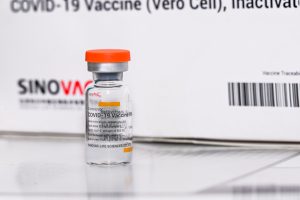Korea observers have undoubtedly spent the bulk of January analyzing Pyongyang’s most recent ballistic missile tests. A variety of angles have been taken, with some speculating about motivations while others have focused on potential advancements in technology. Given the fact that similar events in the past have tended to function as a prelude to bartering with South Korea, the United States, and Japan, it seems plausible Pyongyang is again signaling a desire for dialogue.
When considering possible North Korean asks, two items immediately present themselves as likely candidates: economic relief and food aid. Throughout the pandemic, North Korea has operated what can only be described as a complete lockdown, isolating itself from international contact, even from its closest trading partner: China. It is estimated that trade with China, which had accounted for over 90 percent of all North Korea’s pre-pandemic exchange, declined by more than 80 percent during the pandemic, with the value of Chinese exports to North Korea dropping to less than 1 percent of previous figures in 2020 and recovering to only 12 percent in 2021.
Food insecurity, which describes the risk of starvation, was estimated to affect 43 percent of all North Koreans in 2019. Mid-pandemic numbers are unavailable but stalled trade and powerful typhoons in 2020 are likely to have increased this number significantly in 2021, prompting Kim Jong Un to admit last June that the nation’s food situation was “getting tense.” South Korea’s National Intelligence Service subsequently revealed Kim had issued a national decree for all civilians to devote “every effort” to farming and securing “every grain of rice” possible in the fall.
In addition to being unable to import food, fuel, fertilizer, and textiles, another key objective often overlooked by foreign observers is Pyongyang’s desire to acquire COVID-19 vaccines. Since early 2021, North Korea has been in repeated contact with COVAX and other U.N. entities in charge of international vaccine distribution. In March, the U.N. allocated 8.1 million doses for North Korea, enough to inoculate over 15 percent of its population. These deliveries were never made, however, apparently over concerns with storage, distribution, and legal indemnity against post-injection side effects. The resulting impasse prompted a second offer of 3 million doses of Chinese Sinovac vaccine, which Pyongyang rejected for reasons that remain unclear.
Like most other countries, it seems likely North Korea’s initial calculation was that there would be an eventual end to the pandemic, after which the country could reopen, resuming pre-pandemic business as usual. Given the continuing emergence of mutational variants, however, the world is now coming to grips with the reality that COVID-19 is here to stay, necessitating an alternative approach that focuses on coexistence. Interpreted differently, this means every person on the planet is essentially guaranteed, at some point, to encounter the virus, much like all of us are destined to eventually catch the common cold. For a hungry, underdeveloped, unvaccinated country like North Korea, the potential consequences of this reality are nothing short of daunting.
Perhaps the most convincing sign of North Korean desperation comes through a recent report that Pyongyang temporarily reopened some rail services to China in the last week of January. Many speculate this was part of an effort to receive badly needed food supplies. With Chinese vaccines known to be less effective against the Omicron variant and reports of large-scale lockdowns across China, indicating infections there are likely more common than reported through official figures, Pyongyang must be aware that contact with its northern neighbor, however minor, comes with the serious risk of allowing coronavirus to enter the country. Similar risks apply to aid set to be provided by a South Korean humanitarian group, which recently received U.N. exemption to deliver healthcare supplies. Even if all Chinese and South Korean delivery personnel are vaccinated, this does not prevent them from being capable of transmitting the virus to North Korean recipients.
Thus far, the North Korean lockdown does appear to have protected the country from a significant outbreak. Reliable reports of North Korean COVID-19 cases are, of course, hard to come by, but it does appear the country has not yet suffered any large-scale epidemic, something that would be exceeding difficult even for North Korean officials to hide. Given that the North Korean healthcare system is utterly ill-equipped to deal with such an event, any subsequent fallout would be calamitous. With preventative measures like masking now known to be significantly less effective against the Omicron variant, it is exceedingly unlikely that sustained international contact can be conducted in a way that totally prevents virus transmission. Despite the risks, North Korea’s recent moves can only indicate that some significant tipping point of desperation has been reached, necessitating the acceptance of this danger.
With mounting evidence demonstrating that COVID-19 hospitalizations and death are significantly reduced by vaccination, even for Omicron, North Korean authorities are sure to have reached the correct conclusion that mass vaccination is now the only viable way to emerge from the pandemic unscathed. This means Pyongyang is essentially on the clock in acquiring significant vaccine contributions to stave off outbreaks while simultaneously maintaining international aid imports.
Many will argue the added leverage of this desperation may be just the thing to bring Pyongyang back to the negotiating table, creating a new opportunity for nuclear disarmament. Others will suggest the situation should be exploited further to force the North Korean regime into collapse, an outcome that is not necessarily guaranteed even if the country were to suffer a full-blown epidemic on a national scale. The latter event would also entail a great loss of civilian life, something that a timely offer of vaccines could help avoid. Given that the Biden administration has repeatedly signaled a willingness to consider vaccine contributions, we should expect such offers to play a central role in any upcoming deliberations.































